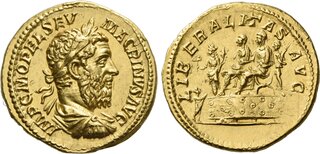| Numismatica Ars Classica > Auction 146 | Auction date: 8 May 2024 |
| Lot number: 2373 Price realized: This lot is for sale in an upcoming auction - Bid on this lot  | Show similar lots on CoinArchives Find similar lots in upcoming auctions on |
| Lot description: Macrinus, 217 – 218. Aureus 217-218, AV 20 mm, 7.00 g. IMP C M OPEL SEV – MACRINVS AVG Laureate, draped and cuirassed bust r. Rev. LIBERALITAS AVG Macrinus and Diadumenianus seated l. on platform; behind officer standing l.; before Liberalitas, holding abacus and cornucopiae. Below platform, citizen. C 43. BMC 71. RIC 79. Kent-Hirmer pl. 97, 414 (this reverse die). Calicó 2947. Very rare. A magnificent portrait struck in high relief and an interesting reverse composition. Minor edge marks, otherwise good extremely fine Ex Bourgey 18 November 1957, 336; NFA 27, 1991, 151 and NAC 62, 2011, 2048 sales. Macrinus, who was of Berber origin, was Rome's first emperor of equestrian background and was Rome's only emperor to hail from Mauretania. He was a prominent jurist and bureaucrat, such that when Caracalla ascended the throne upon the death of Septimius Severus he made Macrinus his praetorian prefect. As commander of the imperial bodyguard, Macrinus was with the emperor in the East during Caracalla's preparations for his planned invasion of Parthia, and it was at Macrinus' instigation that Caracalla was assassinated by one of his own soldiers, Justin Martialis. After Caracalla's murder, Macrinus proclaimed himself emperor, assuming the titles and powers that came with the position of supreme leadership without awaiting confirmation from the Senate in Rome. This along with his less than noble origins (all previous emperors had hailed from the senatorial class) did not especially endear him to the Roman Senate. Furthermore, unlike his predecessor, Macrinus was more circumspect with the imperial finances. Where Caracalla had increased the soldiers' yearly pay from 2000 to 3000 sestertii, Macrinus decreed that any newly recruited soldiers would receive the salary that had existed before the increase. This is understandable given the dire situation of the State's finances, and was an absolute necessity given that Caracalla's expensive military campaigns had all but depleted the state's coffers. The veteran soldiers, however, saw this as the precursor to their own eventual reduction in pay and privileges, and when the opportunity presented they revolted. That opportunity came because Macrinus had made the mistake of freeing the extended family of Caracalla, allowing them to return to their hometown of Emesa. Still based at Antioch – Macrinus never had the opportunity to visit Rome after becoming emperor – his safety became jeopardised when the scheming aunt of Caracalla, Julia Maesa, used her vast wealth to secure the allegiance of the soldiers or the legio III Gallica, who were stationed at nearby Raphanea. They proclaimed Maesa's 14 year-old grandson, Elagabal, emperor, and the boy's tutor led the troops to engage Macrinus who fled the field of battle and was soon captured and executed. Estimate: 75000 CHF |  |



